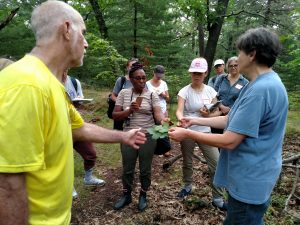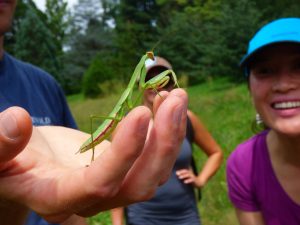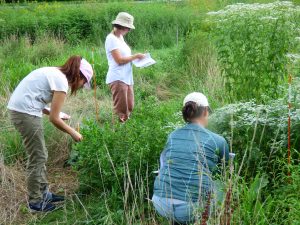When was the last time you closely observed nature for a while? When was the last time you saw children doing the same? Playing ball, running around or having a picnic doesn’t count. A vast majority of children living in urban areas—as well as the adults who teach them—have little connection to nature on a regular basis. When asked why they don’t bring their students outdoors to learn science, most teachers I encounter say they don’t know the plants around them, they are uncomfortable with the elements, they fear misbehavior from the students, or they just don’t have time. Simply put, many teachers don’t know how to teach outdoors because it’s never been a part of their own experience or training as educators.
Enter the Arnold Arboretum 2019 Summer Institute, a free week-long course for Boston Public School teachers and other area educators on how to use the outdoors for life science teaching and learning.



The Arboretum has offered the Summer Institute as a free program for educator applicants since 2016, part of a suite of programs designed to enhance science and nature learning made possible through the Henry Meyer Boston School Initiative. The theme of this year’s program, which runs August 12-16, is Investigating Ecosystems Through Fieldwork and is intended for middle and high school teachers. The curriculum introduces teachers to fieldwork techniques that will enable them to investigate and understand both an urban forest and a meadow ecosystem. Participating educators will learn how to set up study plots, identify plants, collect abiotic data, observe animal and plant interactions, and record their activities and observations in a science journal.
In addition to practicing the “how” of scientific fieldwork, our Summer Institute teachers will learn content from a forest research ecologist, an ecosystem ecologist and professor, a faculty fellow, and Arboretum staff. In the past, teachers have come to value this portion of the Summer Institute: the ability to learn from actual scientists in the field and from practitioners who eagerly share their enthusiasm and knowledge. Special attention is paid to issues of climate change, data interpretation, and vetted resources, while offering teachers ideas for incorporating technology, art, and student choice.
Beyond these objectives, teachers are immersed in authentic nature study where the use of inquiry skills are developed and practiced in community with other teachers. The hope is that by practicing science outdoors themselves, teachers will be more engaged, curious, and comfortable with planning units of study according to their own curriculum needs that work for their students, schedules, and locations.
Teachers are life-long students themselves, balancing their own desire to learn with a vocation to share their acquired knowledge and skills for the enrichment of their students. Finding ways to engage students with nature in developmentally appropriate and authentic projects not only furthers scientific learning, it opens a future of exciting possibilities for young people. At its core, the 2019 Summer Institute is designed to do just that—through fieldwork.
From “free” to “friend”…
Established in 1911 as the Bulletin of Popular Information, Arnoldia has long been a definitive forum for conversations about temperate woody plants and their landscapes. In 2022, we rolled out a new vision for the magazine as a vigorous forum for tales of plant exploration, behind-the-scenes glimpses of botanical research, and deep dives into the history of gardens, landscapes, and science. The new Arnoldia includes poetry, visual art, and literary essays, following the human imagination wherever it entangles with trees.
It takes resources to gather and nurture these new voices, and we depend on the support of our member-subscribers to make it possible. But membership means more: by becoming a member of the Arnold Arboretum, you help to keep our collection vibrant and our research and educational mission active. Through the pages of Arnoldia, you can take part in the life of this free-to-all landscape whether you live next door or an ocean away.
